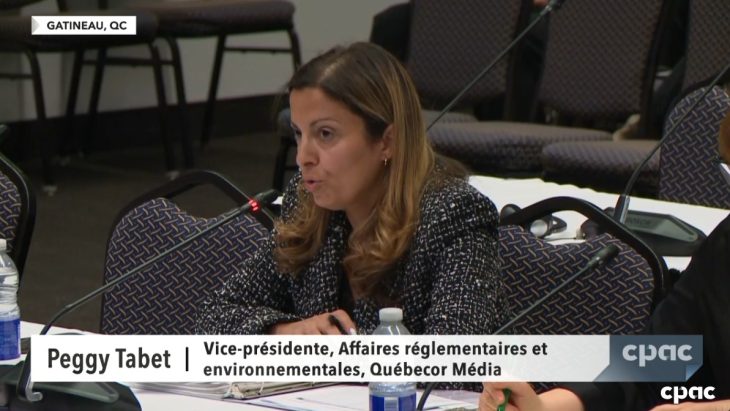
By Ahmad Hathout
Quebecor executives said Wednesday that Radio-Canada, the French-language version of the CBC, should be made to step-up on producing children’s programming because it has become economically difficult to do so for private broadcasters.
The company’s vice president of public and regulatory affairs told the five-member CRTC panel in response to a question about how to sustain the delivery of children’s programming that the public broadcaster — which is already required by the CRTC to broadcast a certain number of hours of kids programming — should pick up where private broadcasters have failed.
“We hope the mandate of Radio-Canada will be tightened because, currently, competition is unfair,” Peggy Tabet said, noting that the public broadcaster is enriched by both federal and private ad dollars, which has frustrated private broadcasters. “Radio-Canada could really focus on its main mission and present content for children. It’s something we no longer do because we don’t have the financial means of doing this.”
Last year, Quebecor shut down its children’s service Yoopa following a distribution rift with Bell.
“Children’s content is extremely popular, but not [on] traditional platforms, more on online platforms,” Tabet added. “For traditional platforms, it should be the mandate of Radio-Canada to produce these shows for children.”
The supply of children’s programming has become an issue of importance during the CRTC’s hearing on the definition of Canadian content for the audiovisual sector.
On Friday, Corus co-CEO Troy Reeb told the commission that kids channels are under heavy pressure from distributors for removal.
Rogers has been seeking to remove some of Corus’s children’s programming for alleged underperformance, but that has been held up as the parties are currently before the Federal Court of Appeal on matters related to that.
Meanwhile, WildBrain’s failure to renegotiate a carriage agreement with Bell to carry its children’s programming after the CRTC dismissed its undue preference application against the big broadcaster has been another blow to that type of programming, Reeb noted.
“The business case for children’s programming has become exceedingly difficult over the last number of years,” Reeb said. “Not only are the distributors pressuring the children’s channels, but increasingly restrictive rules on what advertising can be put on those channels have led to tremendous difficulty around monetization in the commercial environment.
Matt Thompson, Corus’s vice president and associate general counsel, noted the commission cannot just look at the supply of kids programming without also looking at the distribution environment (the CRTC is reviewing the market dynamics between program creators and broadcasters).
“You can’t just focus on the supply side as it relates to kids’ programming, forcing broadcasters with limited distribution opportunities to make a programming that may not be distributed is not a tenable proposition.”
Reeb added that, “if the Commission wants to truly address the demand side, that it should reconsider a proposal that this company, Corus, made many years ago, and that is to ensure mandatory distribution of children’s channels in the cable ecosystem and potentially in the virtual BDU ecosystem as well.
“Not everyone wants to pay for the distribution of children’s services, but they are very important to the cultural fabric and to the entertainment of kids going for.”
Before his election win, Prime Minister Mark Carney vowed to pledge $150 million to shore up CBC/Radio-Canada and enshrine the funding in the law if he was elected.
The promise followed proposed changes aimed to modernize CBC/Radio-Canada by then-Heritage Minister Pascale St-Onge, who pledged in February to secure “stable and predictable” funding for the broadcaster via a statutory appropriation based on an annual per capita formula. Part of the idea is for the CBC to be less reliant on advertising and subscription revenues that “risks compromising its objectives of public service, by favouring revenue-generating content to the detriment of the social, cultural and democratic benefits intended in its mandate.”
But there has been no commitment so far to force the public broadcaster out of the private ad market, which has peeved the private broadcasters who feel it’s not fair that they have to compete with the Mother Corp. in a competitive ad market.
Quebecor’s overall position before the CRTC is similar to other private broadcasters: that its regulatory obligations must be loosened to compete, and it’s simply not enough that the CRTC impose contributions on the online streamers.
The company’s executives also advocated for foreign streamer contributions into the funds, including news. (The foreign streamers have been granted a hearing challenging the base contribution of five per cent of annual Canadian revenues before the Federal Court of Appeal next month.)
The CRTC is also contemplating doing away with programs of national interest (PNI) requirements, which include obligations toward programs that the Indigenous Screen Office, which has an annual budget of about $13 million, described on Tuesday as being at risk: dramas, feature films, and documentaries.
Representatives from the ISO expressed concern that losing PNI would mean a fallback on market forces that, to them, have not demonstrated that they would rush to fund these programs, which they said could jeopardize indigenous cultural expression.
The ISO is proposing that a minimum contribution be required, and that any incentive-based model that may be introduced by the CRTC should not come at the expense of that contribution.
The Public Interest Advocacy Centre (PIAC) also urged Tuesday that the commission ensure that any system the regulator employs — including its proposed expanded point system — incentivizes Canadian content, promotes equity, diversity and inclusion, and is easy to follow.
It also urged the commission, before it contemplates doing away with PNI requirements, to first find evidence that the programs supported by that mechanism will continue to be supported. It also asked the commission to keep in mind that onerous obligations on streamers could mean reduced investment in the country.


